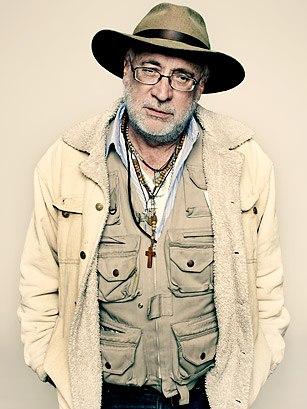
When Javier Sicilia's 24-year-old son, health-administration student Juan Francisco, was brutally killed by drug traffickers in March, it was headline-grabbing news, because Sicilia, 55, is one of Mexico's best-known authors and poets. But the tragedy made Sicilia realize how all too anonymous most of the 50,000 victims of Mexico's bloody drug war have been. Believing that President Felipe Calderón's five-year-long military campaign against Mexico's narcocartels has simply exacerbated the violence, he created the Movement for Peace with Justice and Dignity — which is informally and popularly called Hasta la Madre! or Fed Up! — to push for a stop to the mafia bloodshed and for new anticrime strategies and reforms. The ranks of its rallies and marches quickly grew from hundreds to hundreds of thousands, culminating in a June caravan through a dozen cities, where families held up pictures of slain relatives. By giving names, faces and voices to Mexico's drug-war dead, Sicilia helped prod Calderón to a conference at Mexico City's Chapúltepec Castle over the summer to discuss the kind of modern judicial institutions and social investment that Mexico's political class has too long ignored — but which may be the only way to end Mexico's narco-nightmare.
Sicilia, a left-leaning, spiritual Roman Catholic (aside from his mystical poetry, he's written a novel about John the Baptist), still looks the owlish, bearded bohemian he was at the outset of his campaign. He talked in Mexico City with TIME's Latin America bureau chief, Tim Padgett, about turning personal horror into national hope:
"I got the awful news about Juan Francisco's murder while I was at a conference in the Philippines. When I got to Cuernavaca [the Mexican town south of Mexico City where his son and six friends had been tortured and killed by gangsters who were angry that two of the young men had reported members of their gang to police] I was in a lot of emotional pain. But when I arrived at the crematorium I had to deal with the media. I asked the reporters to have some respect; I told them I'd meet them the next day in the city plaza. When I got there I found they'd put a table [for a press conference] out for me, and I realized this was going to be bigger than I'd anticipated.
"I had never thought of starting a movement or being a spokesman for anything. I'm a poet, and poets are better known for working with more obscure intuitions. But in those moments I was reminded that the life of the soul can be powerful too. My chief intuition then was that we had to give name and form to this tragedy and somehow put that into action with real citizens as a way to tell the government, 'We need something new, especially new institutions to fight our lawlessness and corruption and impunity, not just that of the drug cartels but the state.'
"Mexico has a long history of mobilizing, from the revolution to the demonstrations of 1968 to the Zapatista uprising [of 1994]. Confronting our security crisis, the murders and the kidnappings and the extortion, was more difficult. But like any mobilization, we had to reach the middle class and place the deaths and disappearances in the national consciousness — make visible the face of our national pain. The drug-war statistics were hiding those faces; the powers that be were trying to tell us that all those who were dying were just criminals, just cockroaches. We had to change that mind-set and put names to the victims for a change. And that meant the criminal dead as well as the innocent dead like Juan Francisco. We also have to focus on the poverty and the lack of economic opportunity that helps breed the criminality.
"So that first Sunday after Juan Francisco's death I issued an open letter to the nation's politicians, and I said, 'Estamos hasta la madre!' ("We've had it up to here!") I was surprised by the reaction it got, but I shouldn't have been. On the one hand, yes, hasta la madre is Mexican slang, but it has a very religious component as well. The mother, like the Virgin of Guadalupe [Mexico's Roman Catholic patroness], is sacred. To say you're hasta la madre means they've insulted our mother protector; they've committed a sacrilege. It's very strong, very Mexican, but very poetic too in its own way. Anyway, it resonated in ways that exceeded my expectations.
"The most memorable day, then, turned out to be the first march from Cuernavaca to Mexico City in May. It seemed we started out with about 200 people and by the time we got to the Zócalo [main plaza] here in the capital we had more than 100,000. I remember coming into Mexico City, near the UNAM [National Autonomous University of Mexico] and hearing them performing Mozart's "Requiem" in one of the university's buildings. But then in the Zócalo you could feel the promise of life again. It felt like the civic miracle we needed.
"Still, the movement's success surprised me quite a bit. My intention at the beginning was just to signal the horror of the crimes being committed as well as the government's faulty reaction to it. I did only what my heart was telling me to do. It was a great surprise to me to see the national response. As a Catholic I think a lot about grace, and this was as surprising as the arrival of God's grace. You don't expect it, but it was like the answer to my pain. It eased the pain of my son's death.